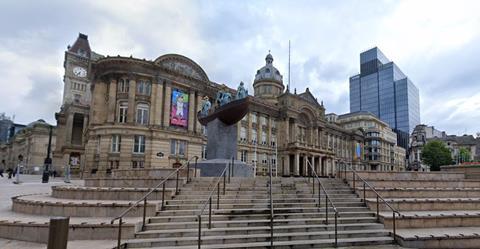Council says proposed local plan changes are not about watering down affordable housing, but about being ‘realistic’
Birmingham City Council is proposing to lower its affordable housing requirement on brownfield sites from 35% to between 20 and 25%.

The local authority said the purpose of the proposed policy, which would set a lower target than that specified in its current local plan, is to ”to set honest and transparent targets on what is realistic in terms of delivery”.
A spokesperson stressed the intention is “not to water down” affordable housing delivery.
She said that its proposed affordable housing contributions for brownfield developments would take into account the variations in home and land values across the city.
>> See also: Plans unveiled for two student accommodation towers in Birmingham
>> See also: What does the collapse in section 106 demand mean for housing delivery?
The council said that “while the current adopted local plan seeks contributions of up to 35% affordable housing, very few sites have delivered this due to financial viability constraints.”
If adopted the change would be part of the council’s new local plan which will provide policies to guide decisions on planning applications up to 2042.
BCC said that developers are not delivering less than 35% affordable housing because of “a lack of aspiration or commitment” but due to financial restrictions.
The council’s statement on the new proposed policy said it needs to prepare a local plan which will meet the legal requirements and be found ‘sound’ by an independent inspector appointed by the government.
The local authority stated “in lowering the ask in those areas of the city where we are currently achieving much less than 35% we are more likely to be able to deliver developments which achieve the levels of affordable housing the policy is asking for.”
A viability assessment suggested that in certain areas, the achievable levels of affordable housing would be even lower than the 20-25% requirement that Birmingham City Council has proposed in the policy.
However, the council has said the proposed levels take into account that the local plan is a long-term document, and the high interest rates and inflationary pressures currently affecting viability are anticipated to have a reduced impact over time.
The consultation on the local plan concluded at the end of August, with the final version of it to be published in early 2025. It will be subject to further consultation before its adoption in around autumn or winter of 2026.
In addition to delivering new homes through S106 agreements, the council said it has provision within its financial plans to deliver up to 250 new homes per year directly.
BCC is progressing with two regeneration schemes in Druids Heath and Ladywood. At Druids Heath, 1,864 homes will be demolished, and 3,267 new homes will be built, 51% of which will be affordable.
However, a recent report from Kerry Scott, the interim programme director for the scheme, highlighted that the Druids Heath regeneration project has a funding gap of £307m.
Ladywood is a 20-year regeneration scheme, which will deliver 7,500 homes once completed.
The council said it has also recently developed several plots on sites that are to be sold to registered providers looking to deliver new homes in the city.











No comments yet